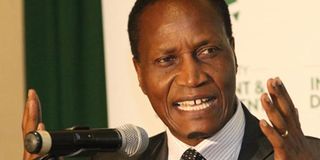Govt may postpone exams in schools affected by terror attacks, CS Kaimenyi says

Cabinet Secretary for Education, Science and Technology Prof. Jacob Kaimenyi at a past event. He said his ministry is considering delaying this year’s national examinations for candidate in areas affected by terror attacks and cattle rustling. FILE PHOTO | JEFF ANGOTE | NATION MEDIA GROUP
What you need to know:
- The senators said it was wrong for the government to treat insecurity casually while students are suffering.
- Some teachers have refused to report back to schools in the affected counties citing insecurity.
The Ministry of Education is considering delaying this year’s national examinations for candidates in areas where schools have been closed because of terrorist attacks and cattle rustling.
Education Cabinet Secretary Jacob Kaimenyi on Wednesday said the only option to give candidates in these areas a fair chance to do the exams was through postponing the Kenya Certificate of Primary Education and Kenya Certificate of Secondary Education exams, slated for October this year.
The CS appeared before the Senate Education Committee, chaired by Kirinyaga Senator Daniel Karaba, to respond to the lawmakers’ concerns about the deteriorating learning conditions in the northeastern and the North Rift regions of Kenya where schools have been closed due to insecurity.
Prof Kaimenyi ruled out giving out special exams to the learners in the two regions, saying it was more difficult to do so as it meant preparing a different set of tests.
“I do agree that the future of the children in these regions is bleak. We have said education is under threat from violent extremism.
"Some quarters have suggested special exams but that is not possible. We have proposed that they sit the exams next year instead of this year,” said Prof Kaimenyi.
Garissa, Wajir and Mandera counties have been hit hard by terrorist attacks in the past one year, leading to the closure of most schools.
Some schools have also been closed in Baringo, West Pokot and Turkana counties over cattle rustling.
VOLATILE REGIONS
Leaders from these areas have been asking the Ministry of Education to postpone national exams, saying the candidates were not adequately prepared to sit for the tests.
Prof Kaimenyi appeared before the committee alongside his Interior counterpart Joseph Nkaissery and both were challenged to reveal what they were doing to bring back normalcy to the volatile regions.
The senators said it was wrong for the government to treat insecurity casually while students are suffering.
“When the children are not in school, they become a threat to all of us because they can easily get radicalised. What do you do to students who are not regularly in school?” said nominated Senator Naisula Lesuuda.
Several terrorist attacks have rocked the northeastern counties, the latest being the killings of 14 quarry workers by suspected Al-Shabaab militants early this month.
The deadliest attack happened in April, when the militants attacked Garissa University College and killed 148 people.
INSECURITY
Some teachers have refused to report back to schools in the affected counties, citing insecurity.
“The lives and success of the young people in this country depends on their education. (The) Kenya National Examination Council is in the process of setting a common exam for all students irrespective of whether they were taught or not and definitely they will not be able to get good grades,” said Uasin Gishu Senator Isaac Melly.
Mr Nkaissery said leaders from the regions were not doing enough to help the government in battling insecurity.
“The political leaders incite their people instead of talking to them to ensure security prevails. Some of them just talk of insecurity while in Nairobi and never go home to talk to their people on the importance of security,” said the CS.
Mr Karaba asked the two ministers to work closely to ensure students get the best learning environment.
"It is not right to say that we are offering education for all yet there is no learning in some areas. The Cabinet secretaries should be able to visit the areas and see for themselves what it is happening there," said Mr Karaba.





